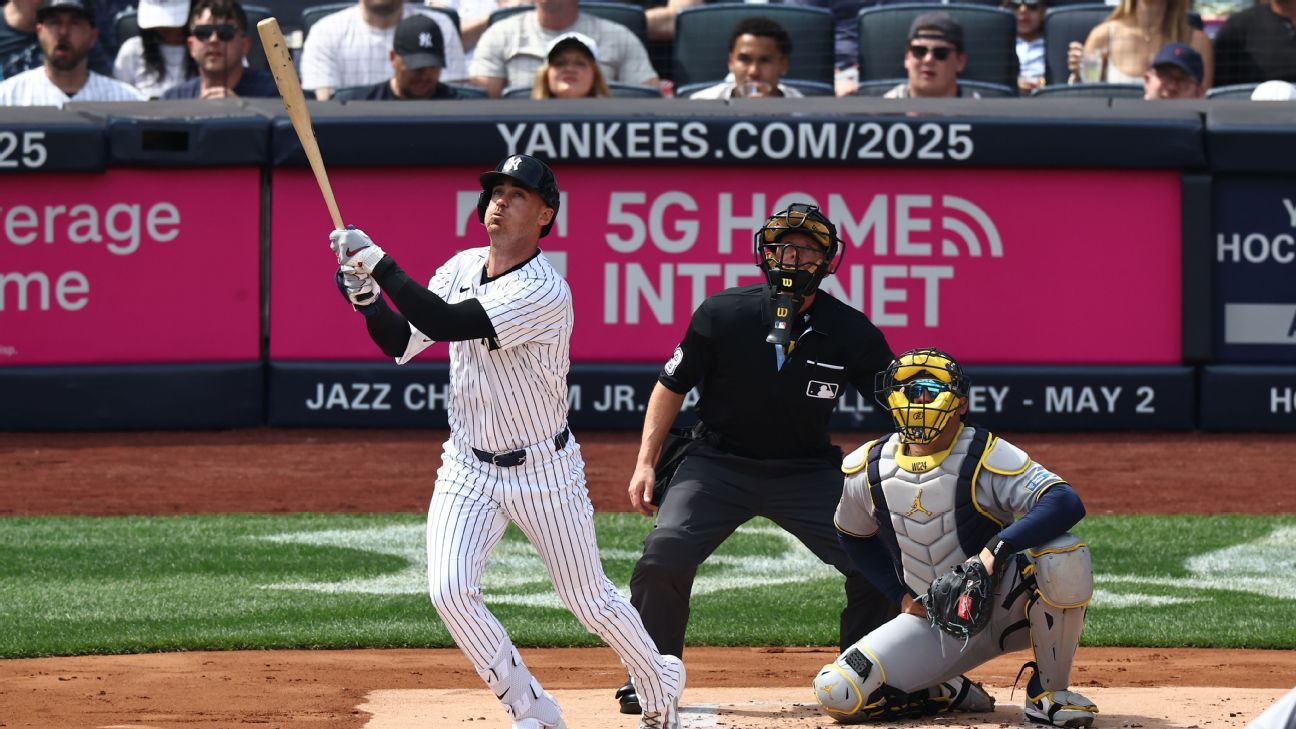
Boone: Yankees’ torpedo bats about being ‘best’
The new torpedo bats drew attention when the New York Yankees hit a team-record nine homers that traveled a combined 3,695 feet on Saturday.
Using a strikingly different model in which wood is moved lower down the barrel after the label and shapes the end a little like a bowling pin, Paul Goldschmidt, Cody Bellinger, Austin Wells, Anthony Volpe and Jazz Chisholm Jr. homered in New York’s 20-9 rout of the Milwaukee Brewers.
“That’s just trying to be the best we can be,” manager Aaron Boone said Sunday. “That’s one of the things that’s gotten pointed out. I say to you guys all the time, we’re trying to win on the margins, and that shows up in so many different ways.”
Major League Baseball has relatively uncomplicated bat rules, stating under Rule 3.02: “The bat shall be a smooth, round stick not more than 2.61 inches in diameter at the thickest part and not more than 42 inches in length. The bat shall be one piece of solid wood.” It goes on to state there may be a cupped indentation up to 1¼ inches in depth, 2 inches wide and with at least a 1-inch diameter, and experimental models must be approved by MLB.
Former Yankees infielder Kevin Smith posted online Saturday that Aaron Leanhardt, a former Yankees front-office staffer who now works for the Miami Marlins, developed the torpedo barrel to bring more mass to a bat’s sweet spot.
“You’re going up with a weapon that can be better,” Smith wrote. “Your just misses could be clips, your clips could be flares, and your flares could [be] barrels. And it was true, it’s fractions of an inch on the barrel differentiating these outcomes.”
Goldschmidt, batting leadoff for the first time, opened with a 413-foot homer off Nestor Cortes, and Bellinger followed with a 451-foot drive that initially didn’t register with Statcast. Aaron Judge, using a bat with a conventional shape, hit a 468-foot shot that made the Yankees the first team to homer on each of a game’s first three pitches, according to the Elias Sports Bureau.
Bellinger first was presented with the torpedo-shape concept in a batting practice session last season with the Chicago Cubs but did not use it in a game. He was given a more advanced version during spring training this year.
“I started swinging this one in spring or before spring, kind of early on, and I was like, ‘Oh it feels good,'” Bellinger said. “It was an ounce lighter than the one I was swinging, but I think the way the weight was distributed felt really good.”
Bellinger, the 2019 National League MVP with the Los Angeles Dodgers, switched from a maple Louisville Slugger to a birch bat and cited MLB’s 2010 rule change narrowing the maximum diameter from 2.75 inches.
“I’m usually a maple guy, but birch for me allows me to get the bigger barrel because I wasn’t grandfathered in,” Bellinger said. “So it’s all within regulation. They made sure that before the season even started, knowing that I imagine at some point the way these bats look that it’s probably going to get out at some point.”
Volpe, who homered for the second straight game Saturday, began using the torpedo bat in spring training.
“The concept makes so much sense. I know I’m bought in,” Volpe said. “The bigger you can have the barrel where you hit the ball, it makes sense to me.”
Judge, who hit an American League-record 62 homers in 2022 and 58 last year en route to his second AL MVP award, didn’t see a reason to experiment.
“The past couple of seasons kind of speak for itself,” Judge said a day after his third career three-homer game. “Why try to change something?”
Milwaukee manager Pat Murphy said he knows a little about developing and designing bats from serving on the boards of two bat companies.
“Players are doing everything to try to get an edge today legally, and I think they should,” Murphy said. “I think whatever is good for the offensive game is good for the game.”
The Associated Press contributed to this report.










